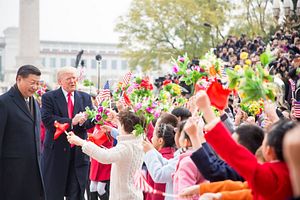In his latest op-ed in the Washington Post, John Pomfret — the former Washington Post bureau chief in Beijing and author of the book The Beautiful Country and the Middle Kingdom: America and China, 1776 to the Present — directly warned Chinese President Xi Jinping not to assume that he can “ dodge a crisis” in U.S.-China relations “simply by appealing to [U.S. President Donald Trump’s] vanity” during his trip to China. But Xi apparently believes the opposite: not only can he “dodge a crisis” — if there is one — he can also win the game. After all, crisis in Chinese means both danger and opportunity. At least in Beijing’s eyes, China just scored a big victory bilaterally, and even domestically and internationally.
One victory is for sure: Xi has won Trump’s heart exactly by “appealing to his vanity.”
As The Diplomat reported, Trump received emperor-style “state visit plus” treatment during his the-day visit in Beijing. Trump also became the first foreign leader who has dined in the Forbidden City since the founding of the People’s Republic of China (PRC). Although the Chinese government didn’t reveal any details about this private dinner, Trump himself admitted that it was “beyond” terrific. He highly praised Xi publicly the next day, before their expanded official meeting:
Our meeting last night was absolutely terrific. Our dinner was beyond that. We had a dinner that was going to last quickly — 20, 25 minutes — because I was traveling and you were so nice, and you said, we’ll just do a quick dinner. And I think it had to last at least two hours, and we enjoyed every minute of it with your beautiful wife and Melania together.
Trump also repeatedly complimented China on his Twitter account and even replaced his Twitter background image twice with photos including Xi and wife Peng Liyuan.
Economically, China also bombarded the United States with multi-billion-dollar deals that broke records in the trade history between the two countries. By signing deals worth $253.4 billion during Trump’s three-day visit, China and the United States have created a “miracle,” as China’s Commerce Minister Zhong Shan said.
Through this “miracle,” Xi has also sent a clear message to the international community: China can buy its way out of global issues. Or as Hu Xijin, Editor of the Global Times, one of China’s most aggressive newspapers, put it in blunt language in his instant video commentary: “If you want to make money, then get along with China; otherwise, you’ll stay poor. The world should get it now. ”
Trump seemed to perfectly get the point. During a business event with Xi, Trump blamed the past U.S. administrations for the “huge” bilateral trade deficit rather than China — a country “able to take advantage of another country for the benefit of its citizens” — which was in sharp contrast with his previous rhetoric.
The specific words not only won rounds of applause from the audience at the event, but have been widely circulated in Chinese state media as well as social media as a demonstration of the United States’ softened stance.
Furthermore, Trump didn’t take any questions at the press conference under China’s insistence; nor did he mention any human rights issues — traditionally the most annoying topic in Beijing’s eyes — as his predecessors had done. Both developments once again deepened the impression sent to the audience in China as well as the world: China has won a diplomatic victory over the United States.
Before the state dinner on November 9, in his speech, Xi quoted America’s Founding Father Benjamin Franklin, saying that, “He who can have patience, can have what he will.”
Trump’s trip in Beijing seems to have fully demonstrated the saying to the world: China can have what it will, using patience as well as money.

































